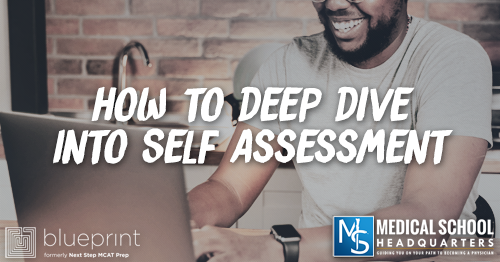Apple Podcasts | Google Podcasts

Session 179
Building a study plan for the MCAT can be almost as scary as the MCAT itself, but it doesn’t have to be. Phil and I give tips, timelines, advice, and more!
Blueprint MCAT (formerly Next Step Test Prep) is soon going to be Blueprint MCAT. Stay tuned for the changes!
Listen to this podcast episode with the player above, or keep reading for the highlights and takeaway points.
[02:20] How to Maximize Your Score
The scope is monstrous. It’s so large that your usual strategies for studying a physics exam wouldn’t seem to work on the MCAT. The MCAT is very different because you have to start months in advance.
'A study plan is really important. The MCAT is not just content. A lot of it is the application side as well.'Click To TweetThe MCAT requires figuring out how to work in time for the content and how to space out the content. Should you hit all physics and then just work through stuff? Beyond that, you have to consider taking full-length exams and figuring out the timing, endurance, and stamina. You have to think about how to do the data interpretation.
You have to figure out your little shortcuts for the map and noticing the trends on how the AAMC is encouraging you to think through this, not just the content overall.
It gets overwhelming especially when you have classes or kids or friends. You’re a real human with other stuff going on. Accomplishing the stuff you need to accomplish for the MCAT is already a pre-monstrous task. Hence, figuring out how to schedule this is something you want to think about.
[04:30] Mixing Up Content and Application Practice
You’re going to have to mix up content and application practice. It’s not going to be a perfect 50-50.
A lot of times students want to do the content first and then take practice exams. This is not a good strategy for a couple of reasons.
'The way the exam is going to be testing you should be influencing how you're studying.'Click To TweetStart a little bit heavier on the content and gradually shift as more of a gradient thing.
Always start with some form of a diagnostic. It’s going to help you understand how the MCAT is going to test this material. It’s going to inform and change the way you’re studying.
Spend the first 25%-30% of your time doing mostly content. Take your first exam there for another 10% to 15% of your time. Then take another exam. And then do exams more frequently as you go along.
When you get to the tail-end, you’re not done with content. You’re never done with content.
[08:22] Data Interpretation, Endurance, and Stamina
There’s a high level of data interpretation on the MCAT especially in the bio section but even in the chemistry and the psych/soc section as well. There’s this avalanche of jargon coming down on you.
It’s very easy to be overwhelmed because most biology majors haven’t seen that kind of stuff. As a result, people who get to the exam won’t know how to deal with the passage. If you’re just doing content, you’re missing some of that.
'You also need to work on stamina, endurance, timing, and fatigue.'Click To TweetThe first time any student takes an exam is going to be exhausted by the end of it. You’re fried. It’s like somebody running five miles for the first time when you’ve not run at all. But if you run five miles everyday for months and months, you’re going to find it easier.
Generally, the biology and psych scores that people take on their first exam are lower than it should be. You’re six hours into this exam and you have an hour and a half left. You’re a cooked noodle at that point. So working on that is something you want to work on these practice exams.
[10:55] Creating Your Study Plan
Check out Blueprint MCAT (formerly Next Step Test Prep)’s free study planner tool. Get your calendar and if there are days that you need to take off, cross those off. Don’t plan on studying on days you’ve got stuff going on. Build out your schedule there.
'25% of the way through that is when you should be taking your first exam.'Click To TweetFor instance, if you’ve got four months to study, take the exam after the first month. Then take an exam again one month into that. Then take it after two weeks and then every week after that.
The first exam you take on your own you’re going to be through half of the content. You want to get through most of the content in that first eight weeks, which is when you hit the second exam.
Get some books for your prep as you need some content there. Start to plan ahead and weigh out how many chapters a week you need to do in order to hit that deadline. And in two months, you should be halfway done.
[13:00] Is There a Rule of Thumb for How Much You Should Be Studying?
It’s going to be different for different students. If you have a physics degree, you’re going to get your physics much faster than somebody who has left undergrad 10 years ago and is now working as a nurse.
You want to have a bit of flexibility in being able to adjust. Plan for one day a week just to catch up on the stuff you’ve done before.
'Generally, from beginning to end, 350 hours is a good set for how long to expect to have to spend to really knock the MCAT out of the park.'Click To TweetIf you’ve got ten weeks, you need to work 35 hours a week. And that’s a lot. This would be two and a half months. If you could expand that out a little bit, you may only have to work 22 hours a week. So plan for this.
[14:10] Doing a Grab Bag of Topics Throughout the Week
It feels really good to knock things off of a list and cross them out. But if you do that, and it’s been two months since you’ve looked at physics, that’s not good.
You want to do a grab bag. For example, you do Physics on Monday and Chemistry on Tuesday. Then you do Bio and Biochem on Wednesday, Pscyh/Soc on Thursday. And Friday, you try to catch up on whatever it is that you weren’t able to get done earlier in the week. Or you go out on Friday night but work Saturday morning.
'Think about what realistically you're able to put in.'Click To TweetAlso, recognize what’s going on with you. If you don’t have enough time to put in, then maybe you need four months. So be realistic.
[15:55] Doing Practice Questions
Try to get into the mindset of how you’re going to be asked and how you’re going to apply it. Do a lot of practice questions in Chemistry and Physics.
'The battle in Chemistry and Physics is knowing when to use what equation. It's not knowing the equations.'Click To TweetYou need to do a lot of practice questions because that helps you figure out when to use the equations.
[18:30] When to Push Back Your Test Date
If you’re planning on taking the test in March, you have some wiggle room to push back a couple of months and still be early in your application when summer hits.
But if you’re dead set on getting your application in this year, and you’ve got three months. You have to take your exam and the end of the three months is the last day of July. You can’t really push back too much farther than that. You can push back to August and September. You can get in that way but it’s a lot harder.
It doesn’t have to be a straight one-year thing. Rounding off study time to 400 hours, that’s 100 hours a month. That’s about 25 hours a week. Or you could do 15 hours a week for these couple of months. Then after school ends, you could put in like 35 hours a week in specific areas.
'Knowing your own schedule and knowing how to make that work is big. You definitely have to plan ahead.'Click To Tweet[20:00] Know Yourself and Plan Ahead
You have to know yourself. Have that self-reflection on whether you need more structure. You might need a little bit of structure because you won’t be able to self-study, then consider taking an online course.
'Developing a study plan and sitting down and working through all of it, makes it a lot more achievable.'Click To TweetWhen you don’t plan ahead, you’d have this giant mountain in front of you and you feel like you don’t know where to start. You keep pushing it off. Then all of a sudden, a month has gone by and you actually haven’t accomplished anything because it’s just insurmountable.
[21:40] Spacing Practice Tests and Review
Take about one exam a week. Don’t do more than once every five days because this is an insane pace. But once you get to the last month, the four scored AAMC tests can be taken on each of the Saturday before your actual exam.
'The last month is the month of the AAMC exams.'Click To TweetUse this exam as a diagnostic. Again, you’re not done with content once you get to the end. The reason is that you take the exam, you review it, then figure out what you missed and why. You’re going to have a list of the things you need to do.
For instance, you need to work on your timing in CARS, you need to look over electrochemistry, and you need to work on data interpretation in Biology. And this is what you’re going to work on for the next three or four days.
Take the exam. Review it for a day or two. Hit your weak areas and then you take another exam. That’s about a week between exams. This way, you’re improving between exams. This is really crucial.
'If there's anything that students just generally don't do enough is the review.'Click To TweetDon’t just review whether or not you got an answer correct. Also, review your correct answers. How should you be thinking? This is highly self-reflective and understanding yourself as a way to understand how to deal with the test.
[27:44] When Your Score is Not Improving
You don’t see your scores improve on the first exam. This can be scary for students. They’re hitting content and then they take the first exam. They’re a quarter away through their prep. That’s terrifying!
But a lot of this is the application side. You need this fundamental foundation in order to apply stuff and passages.
'A lot of the first full-length exam you're doing is figuring out timing, endurance, and stamina, and data interpretation.'Click To TweetIf your first exam score is the issue, don’t panic. Just stick with the process. Most of the time the major growth is in the last part. But you have to prepare the foundations for that by getting through the content.
On the other hand, if life happens, it’s really hard to stay focused on the MCAT. Then maybe you should be taking a little bit of time there. Be realistic. It’s not the end of the world if you push back a year because of issues going on with your health or family members or losing your job.
'You have to take care of yourself as well. Don't get to the point where everything just implodes.'Click To Tweet[33:20] What to Score in Your Full-Length Exams
You need to understand that all your scores on the practice exams are never going to be your exact MCAT score. The first reason is that the test you’re going to take is going to be completely different than anything you’ve seen before. Secondly, real test anxiety is going to completely change your physiology and you may freak out. Check out PMY 337: How to Overcome Test Anxiety and Take Back Control.
In theory, you’re hoping for stability in your scores on all of your practice exams. A lot of times, the week after the actual exam, a student’s score will drop. This is the worst time for their ego for their scores to be dropping.
This comes down to pressure. Students tend to work harder and put in more work, time, and effort.
'Two or three days before the test should be the easiest days of your entire prep.' Click To TweetThe two days before the exam are the days you should be taking relatively off. Relatively, because if you have to do stuff, then just do the really low-difficulty stuff. Just review vocab or your equations, the minor things. Don’t do a full exam.
So if you’re shooting for 509-511, maybe the week before the exam, you’d go down to 508. That’s not a reason for you to call off the exams. Just relax.
Links:
Blueprint MCAT (formerly Next Step Test Prep) (Call 866-295-6586 and let them know you heard about them here on the podcast)
SEARCH SITE
SEARCH SITE
LISTEN FOR FREE











